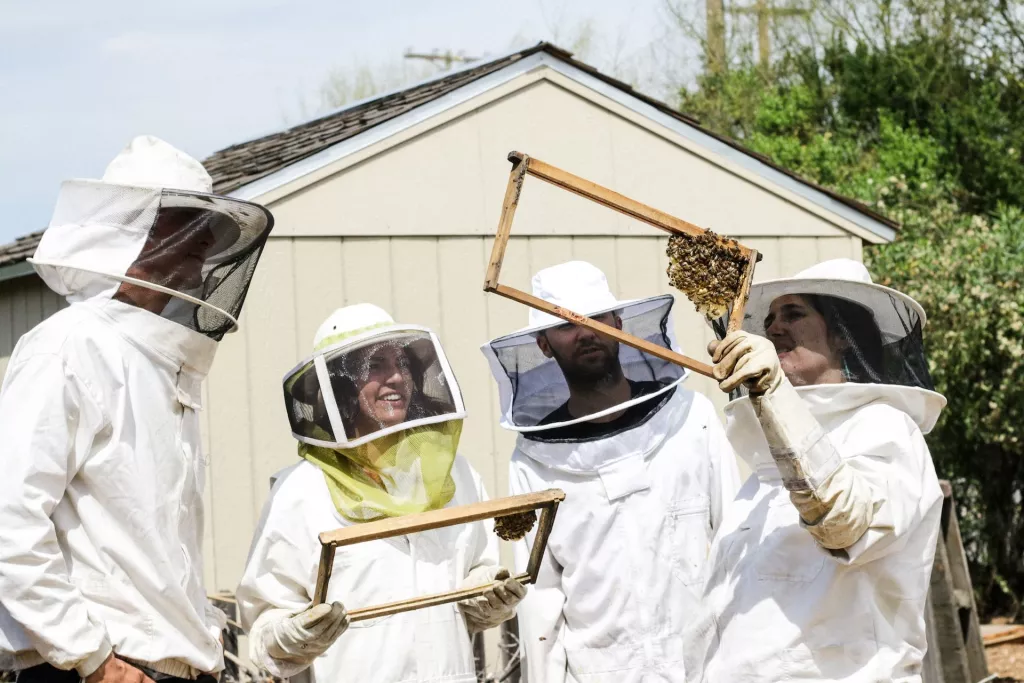Beekeeper Education Requirements - Know This Before You Start
Has your experience or interest in beekeeping inspired you to take up further education on one of the busiest workers in the world? We’ve been there! Here’s what you need to know about studying for apiculture.
You don’t need formal qualifications for beekeeping. Many begin through apprenticeship under an experienced beekeeper. Those who want to research bees usually go on to get a bachelor’s degree in a related field. Others who prefer to harvest produce and offer pollination services are fine with a high school diploma.
Beekeeping is a hands-on activity so you'll be spending plenty of time out on the field, working closely with your little bee workers. However, bees are wild insects, even if they're housed in your backyard. Keep you, your loved ones, and your bees safe as you start your beekeeping journey with this article.
Summary
- You don't need formal education to become a beekeeper. The fastest way to earn your chops is to start an apprenticeship under an experienced beekeeper.
- If you do plan on taking up formal education, courses related to biology and the environment are a good choice.
- Strapped for cash? There are plenty of comprehensive online resources and beekeeping communities to help you get started!

On this page:
Would You Enjoy Beekeeping?
What kind of person would enjoy studying bees? The most obvious indicators are people who enjoy working outdoors and do not suffer from bee or pollen allergies. An appreciation for plants and insects is also a plus, as is the ability to work long, irregular hours in isolated areas.
Hive products can become heavy as they accumulate over time, so the ability to lift heavy weights is also a plus. Finally, budding beekeepers should be observant and capable of keeping accurate records to track the progress of their hives.
The Academic Path for Bookkeeping
Hoping to get a degree related to beekeeping? Then it’s best to start early. You can look into the following high school courses to get a comprehensive background on beekeeping:
- Agricultural Education
- Biology
- Mathematics
- Natural Resources
- Horticulture
- Geography
- Statistics
Math and statistics are a strong requirement for students who want to proceed with a science degree. They’ll also be useful in conducting research on bees in the future. If you’re hoping to approach beekeeping from an ecological perspective, then geography can help you get a leg up.
As with most courses, you need to be clear and intentional about the path you want to take in the academe. Your degree depends on how you want to flesh out your job as a beekeeper. You may be interested in beekeeping for conservation efforts, commercial, or industrial opportunities. Here’s a list of universities that offer a degree in the honey bee sciences.

If you’re looking into a career in conservation, go for botany, environmental biology, or fish and wildlife management, commercial beekeeping will involve selling and handling bee products and services, so look into business-related subjects adjacent to beekeeping. Industrial apiculture will involve the use and study of modern developments and methods to cultivate colonies, such as new pesticides and agrochemicals.
Postgraduate degrees on bee studies are available but they’re not required to excel at this job. If you want to go further into research and spend a lot of time on farms observing bees, then this is a good opportunity to expand on your experience by taking related postgrad fields in data and agricultural science.
Cost of Beekeeping Education
| Type | Cost |
|---|---|
| Classes | $45 to $75 outside of university, thee may be free educational courses online as well |
| Membership - Beekeeper's Association | $15 to $30 |
| Books | ~20 |
| Youtube and Social Media | Free |
Beekeeping can be an expensive hobby. It would be a waste to invest in all the tools, hives, and gear needed to start out—only to get discouraged because you did not have the support or the knowledge you needed to make the most out of your efforts. Luckily, there are plenty of resources on beekeeping at your disposal.
If you just have an inkling of interest in beekeeping, then youtube and social media is the best place to start. You do not have to make any commitments; all you need to do is enjoy looking at other beekeepers maintain and grow their hives. Once you’re more invested in bees, you may want to start buying some books or joining the local Beekeepers’ Association.
Formal classes are definitely going to be the most expensive investment you’ll make, but if you’re already set on opening an apiary, then they’re worth the spend. You’ll have the privilege to learn directly from expert beekeepers. Some classes even offer plenty of hands-on training to help you go through the motions of caring for hives.
Different Career Paths for Beekeeping
Hobbyists
Many beekeepers manage small and medium-sized apiaries. They’re not necessarily profit-driven; many operate mainly because of their love for the craft. Beekeeping can be an incredibly fulfilling experience, which is why so many people are drawn to it. They also benefit from having honey and other hive products to use personally.
Commercial Beekeepers
Commercial beekeepers run entire bee farms, which may require more managerial skills. They’ll need to consider hiring and training other beekeepers to maintain the hives, managing the marketing and sales aspect of hive products, accomplish bookkeeping tasks, and keep a close eye on hive growth and health.
Other beekeepers don’t have farms, but instead invest their efforts in crop pollination. They travel around their state, supplying bees as a service for pollinating crops to other agriculturists. It’s valuable work, especially in areas where native or wild pollinators are not enough to pollinate crops.
Researchers
While honey bees aren’t considered endangered yet, they are still considered an at-risk species. This is because of the highly-publicized Colony Collapse Disorder, which is characterized by sudden colony death cause by a lack of healthy bees inside the hive. Since bees play such a critical role in agriculture, some beekeepers have chosen a career in research.
Bee researchers study parasites and monitor the effects of pesticides. They also monitor and record bee activities and move hives to observe their behavior in different environments. Their work is critical to understanding how climate change affects bee behavior.
Beekeeping Professional Organizations and Events
Since beekeeping is such a massive industry, there are plenty of organizations you can join to expand your network and knowledge of apiculture.
American Beekeeping Federation
The American Beekeeping Federation is the governing body responsible for establishing target prices, creating a marketing program for honey, controlling the theft of apiary equipment and bees, and encouraging the study of apiculture in higher education. This is the organization that will act in behalf of the beekeeping industry on issues that affect apiculture in the country.
The ABF also hosts the American Beekeeping Federation Conference and Tradeshow, which is the largest event for beekeepers in the country. This usually happens at the start of the year.
Apiary Inspectors of America
The Apiary Inspects of America (AIA) is a nonprofit that supports beekeepers around the country by providing regulatory guidance and enforcement, inspections, education, and research on bee pests, parasites, and pathogens. The organization is composed of state and provincial beekeepers, inspectors, and other collaborators from adjacent regulatory, academic, and research-based institutions.
American Honey Producers Association
The American Honey Producers Association is an organization for beekeepers, run and maintained by fellow beekeepers in the country. It serves as a valuable resource for the latest industry news and other related events.
The AHPA is also responsible for hosting the AHPA Conference and Trade Show, which is usually scheduled to occur towards the end of the year.
Foundation of the Preservation of Honeybees
The Foundation of the Preservation of Honeybees is a charitable research and education foundation for those who are studying bees or working in the bee industry. This year, it’s offering four $5,000 scholarships to apiculture graduate students, and travel and lodging expenses up to $750 for their trip to the American Beekeeping Federation Conference and Tradeshow.
State and Local Beekeepers Associations
Your local Beekeepers’ Associations are probably going to be the closest and most comprehensive resource for all your concerns and issues on keeping bees. Seek out your local beekeeping community and get to know your friendly neighborhood bee enthusiasts!